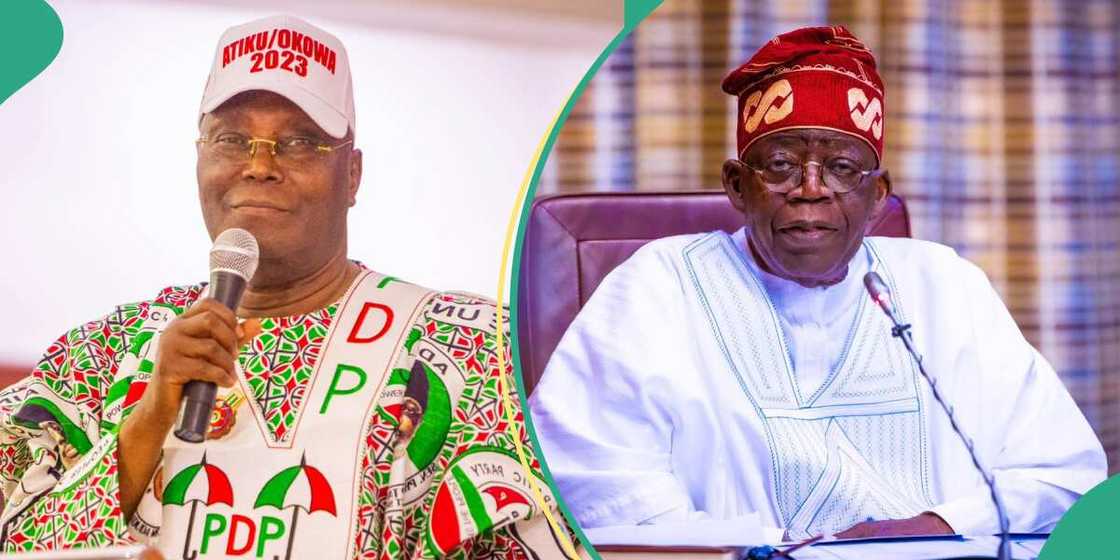Economic Hardship: Atiku Blasts Tinubu, Lists 4 Policy Prescriptions To Rescue Nigeria
- PDP presidential candidate, Atiku Abubakar has accused President Bola Tinubu of hurriedly putting together the new policy FX management policy without proper plans
- The former vice president said Tinubu's administration failed to anticipate or downplay the consequences of its action
- Atiku suggested four policy prescriptions he said would rescue Nigeria from its present economic downturn
Legit.ng journalist Adekunle Dada has over 5 years of experience covering metro and government policy
FCT, Abuja - Former vice president Atiku Abubakar said President Bola Ahmed Tinubu told experts who were offering ideas on how to resolve the economic crisis that they do not distract him and his team.
Atiku said this happened at a meeting called to address the Foreign Exchange crisis and the problem of economic downturn on Thursday, February 15.

Source: Facebook
The presidential candidate of the Peoples Democratic Party (PDP) disclosed this via his X handle (formerly known as Twitter) @atiku.
PAY ATTENTION: Click “See First” under the “Following” tab to see Legit.ng News on your Facebook News Feed!
He said he could not continue to keep quit as the Tinubu administration's wrong policies continued to cause untold pain and distress on the economy.
“Tinubu’s new policy FX management policy was hurriedly put together without proper plans and consultations with stakeholders. The government failed to anticipate or downplay the potential and real negative consequences of its actions”
Atiku listed four policy prescriptions that would rescue Nigeria from the mess the country is currently in.
Four policy prescriptions to rescue economic downturn
1. I had signed on to a commitment to reform the operation of the foreign exchange market. Specifically, there was a commitment to eliminate multiple exchange rate windows. The system only served to enrich opportunists, rent-seekers, middlemen, arbitrageurs, and fraudsters.
2. A fixed exchange rate system would be out of the question. First, it would not be in line with our philosophy of running an open, private sector-friendly economy. Secondly, operating a successful fixed-exchange rate system would require sufficient FX reserves to defend the domestic currency at all times. But as is well known, Nigeria’s major challenge is the persistent FX illiquidity occasioned by limited foreign exchange inflows to the country. Without sufficient FX reserves, confidence in the Nigerian economy will remain low, and Naira will remain under pressure. The economy will have no firepower to support its currency. Besides, a fixed exchange rate system is akin to running a subsidy regime!
3. On the other hand, given Nigeria’s underlying economic conditions, adopting a floating exchange rate system would be an overkill. We would have encouraged the Central Bank of Nigeria to adopt a gradualist approach to FX management. A managed-floating system would have been a preferred option. In simple terms, in such a system, the Naira may fluctuate daily, but the CBN will step in to control and stabilize its value. Such control will be exercised judiciously and responsibly, especially to curve speculative activities.
4. Why control, you may ask.
(i). Nigeria has insufficient, unstable, and precarious foreign reserves to support a free-floating rate regime. Nigeria’s reserves did not have enough foreign exchange that can be sold freely at fair market prices during crises.
(ii). Nigeria is not earning enough US$ from its sales of crude oil because its production of oil has been declining. And,
(iii). Nigeria is not attracting foreign investment in appreciable quantities.
These are enough reasons for Nigeria to seek to have greater control of the market, at least in the short to medium term when convergence is expected to be achieved.
Sani warns Tinubu against IMF policies
Legit.ng earlier reported that a former Kaduna central senator, Shehu Sani accused the International Monetary Fund (IMF) of pushing Nigeria into economic self-destruction.
Sani said that while the IMF is dragging Nigeria down economically, and the African Development Bank (AfDB) has been warning Nigeria against following the advice of the financial agency of the United Nations (UN).
PAY ATTENTION: Unlock the best of Legit.ng on Pinterest! Subscribe now and get your daily inspiration!
Source: Legit.ng


